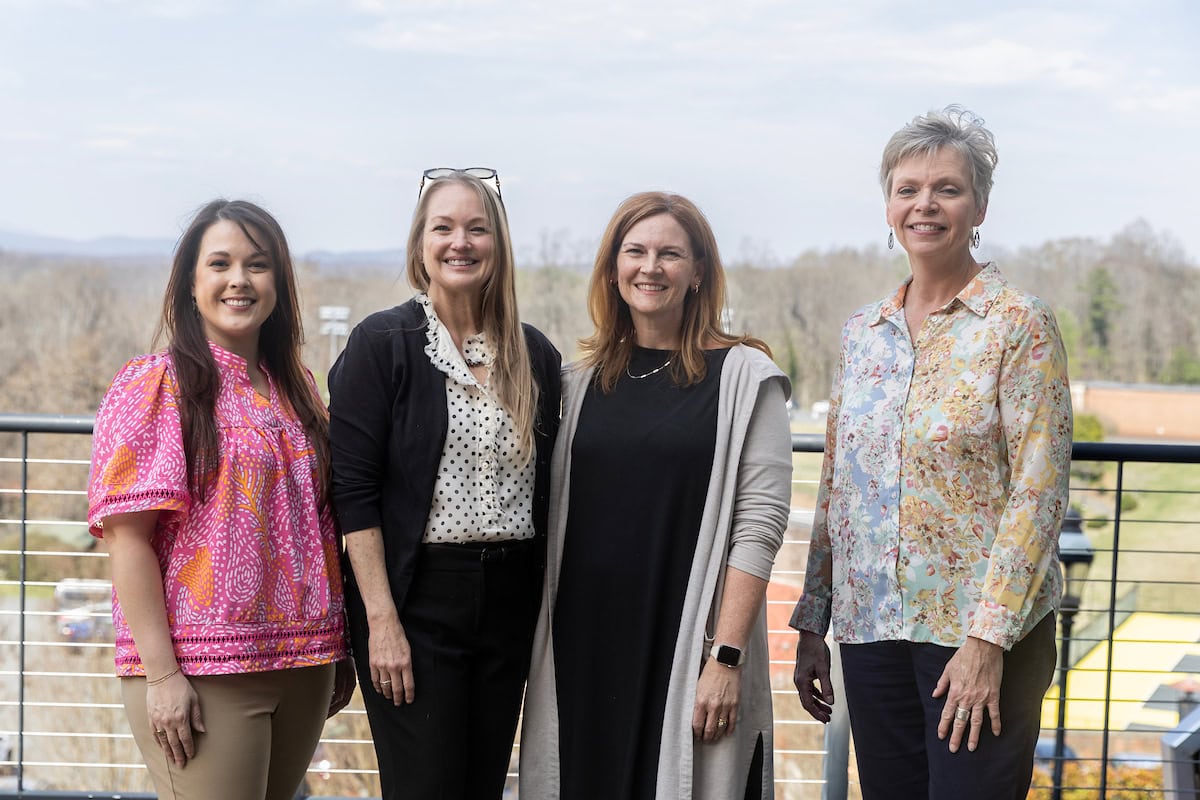Alumnae return for Women in Science Panel

From left to right, Alexis Blankenship ’15, Tiffany Vines ’95, Victoria Turgeon ’93, and Melissa Merrill ’89 pose for a photo together before speaking during Randolph’s 2025 Women in Science Panel.
Melissa Merrill ’89, Victoria Turgeon ’93, Tiffany Vines ’95, and Alexis Blankenship ’15 offered advice to current students and reflected on their careers during Randolph College’s Women in Science Panel on Friday.
They also talked about their experiences at the College and how it shaped them into the scientists they are today.
Merrill, a professor, department head, and director of undergraduate programs in animal science at North Carolina State University, recalled summers working in labs up and down the East Coast—all positions she first saw advertised on campus.
Turgeon, who also went into education, said an organic chemistry class with professor Ann Fabirkiewicz first sparked her passion for teaching, a decision that was reinforced when she was later a TA for a structural biology course.
“For me, it was getting those one-on-one experiences with faculty,” said Turgeon, who is now a professor of biology and neuroscience and the academic director of the Prisma Health Partnership at Furman University. “My biggest reward and responsibility is our students, and everything I do is to create more opportunities for them.”
Blankenship cited those close student-faculty relationships, along with all the hands-on experiences she got in labs, for putting her ahead of the game when she began her career in a North Carolina crime lab.
She now works as a forensic chemist with NMS Labs in Winston-Salem, North Carolina, analyzing seized drug evidence and often testifying about it in court.
Vines came to the College pre-vet and is now the senior director of biopharma business development at Caris Life Sciences.
“For me, it was all the different science I took here,” she said. “And being part of a small school and having those relationships. I always felt like my ideas would be heard and had value.”
The panel also discussed what it’s like being women in their respective fields, how they handle what Turgeon called the “work-life flow,” and the necessity of having a good mentor.
“Find someone you trust, who will tell you like it is,” Merrill said. “And be ready for constructive criticism.”
They emphasized the importance of continuing education. Turgeon said she often sits in on colleague’s classes, to see the intersections between science and other subjects, and Vines regularly pursues new certifications.
“Science is ever evolving, and you need to be on top of what’s happening,” Vines said. “You need to stay curious.”
And, they said, be open to possibilities. Several of the panelists are working in fields they didn’t originally plan for.
“I didn’t choose a major until the night before freshman year, and that’s still not what I’m doing. I chose biology then,” said Blankenship, who eventually switched to chemistry. “That’s the wonderful thing about Randolph. You can take so many classes and find what interests you.”
Turgeon said to take risks now, in a supportive environment like Randolph.
“This place is special, and these years are special,” Vines added. “Take it all in.”
Melissa Merrill ’89, professor, associate department head, and director of undergraduate programs in animal science at North Carolina State University
Merrill graduated in 1989 with a double major in biology and chemistry. She then received her PhD in biochemistry from Wake Forest University, where she worked to identify the gene responsible for an inherited form of thyroid cancer.
From there, she transitioned from analyzing human DNA to examining domestic mammal DNA, taking a research geneticist position with the United States Department of Agriculture’s Agricultural Research Service in Beltsville, Maryland. Her research group worked to identify genetic markers associated with economically important traits like milk yield, disease resistance, and reproduction in dairy cattle.
She moved back to North Carolina in 2003 to take an assistant professor position in NC State University’s animal science department. During her 20 years there, she has taught a variety of animal science and biotechnology courses while also conducting molecular biology research in dairy cattle, cats, beef cattle, dogs, and pigs.
She currently serves as the director of undergraduate programs in animal science, which has over 850 students enrolled.
Victoria Turgeon ’93, professor of biology & neuroscience and the academic director of the Prisma Health Partnership at Furman University
Turgeon graduated in 1993 and went on to pursue a PhD in neurobiology and anatomy at Wake Forest University, where she focused on neuronal development and degeneration.
She received her PhD in 1998 along with the Norman Sulkin Award for Excellence in Neuroscience and was immediately hired at Furman University.
During her time at Furman, her lab has been funded by grants from the National Institutes of Health and the South Carolina Spinal Cord Research Fund.
Turgeon has also received numerous accolades, including the Henry and Ellen Townes Associate Professorship of Biology, the Howard Hughes Medical Institute Distinguished Mentor Award, the Alester G. Furman Jr. and Janie Earle Furman Meritorious Teaching Award, and the South Carolina Independent College and Universities’ Excellence in Teaching Award.
Her most recent professional contributions to Furman include serving as a faculty ombudsman, leading the team that developed Furman’s Master of Science in Community Engaged Medicine, and being appointed as Furman’s academic director of the Prisma Health Partnership.
Turgeon’s work on the National Science Foundation ADVANCE program has led to the development of resources that support the advancement of mid-career women STEM faculty.
She also serves on the board of directors for the South Carolina Spinal Cord Injury Research Fund and Prisma Health’s Medical Experience Academy.
Tiffany Vines ’95, senior director of Biopharma Business Development at Caris Life Sciences
Vines graduated in 1995 with a degree in biology and later attended the University of Arizona, where she pursued a master’s degree.
Over the past 20 years, she has built a successful career in diagnostic testing and clinical genomics, collaborating closely with pharmaceutical companies to support the development of oncology drugs.
Her experience spans molecular diagnostics, including next-generation sequencing, companion diagnostics, clinical trial design, and strategic partnerships, all with a focus on advancing precision medicine.
She has worked for a variety of companies, including Illumina, Qiagen, and Thermo-Fisher.
Alexis Blankenship ’15, forensic chemist III at NMS Labs
Blankenship, who earned a chemistry degree at Randolph, began her career at the Iredell County Sheriff’s Office Crime Lab.
She joined NMS in 2016, first in Willow Grove, Pennsylvania, then in her hometown of Winston-Salem, North Carolina, where her primary focus is controlled substance identification.
She recently had the opportunity to speak about her research in illicit and counterfeit tablet trends at the Center for Forensic Science Research & Education’s 2025 Current Trends in Seized Drug Analysis Symposium.
The Women in Science Panel was sponsored by Framatome and Women in Nuclear.
Tags: 2025 science festival, alumni, alumni accomplishments, biology, chemistry, outcomes, Science Matters, scifest, speakers, women in science
